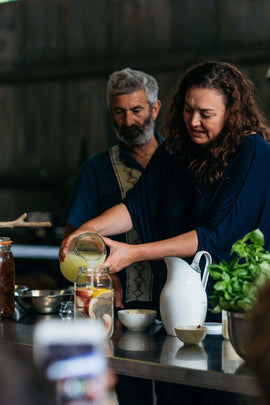What Western medicine has historically merely seen as a digestive system that has to work, Eastern culture has seen as a central theme to their medical structure.
The Japanese refer to the gut as onaka, "honoured middle" and hara, "centre of the spiritual and physical strength". However, the West is catching up, if only because of the explosion of gastrointestinal diseases throughout the West, and a high incidence of declining gut health, including obesity, allergic reactions, chronic inflammatory conditions and autoimmune disorders. More recently, it’s being increasingly suggested that psychological conditions, such as depression and anxiety, are linked to the health of our guts.
The decline of fermentation in Western countries through the 19thand 20thcenturies came as agriculture became progressively industrialised and homogenised. At the same time, science developed increasing knowledge about the dangers of pathogens and Pasteur found that heat can kill the organisms that lead to spoilage and sickness. Pasteurisation has saved a vast number of lives, but Pasteur wasn't able to to recognise then, the complexity of the microbial world, and in the west, we began to see all bacteria as germs to be eradicated, rather than potential life-enhancing allies.
The consequences of this obsession with germs, and fear of bacteria in our foods are vast, and the solutions are complex and multiple, but for our guts to be healthy we need to eat a diverse diet rich in as many varieties of microbes as we can access. The problem is that through the industrialisation of our food system, we rarely encounter the microbial life we need for good gut health.
At The Fermentary, we approach things differently.
Ferments made by different people differ from each other because of who made them, where they were made and what they were made from, where those were made, and a myriad of other reasons that all connect us to something much greater than ourselves.
We are curious about how we have preserved abundance, how we came to know these traditional techniques and worked with natures intellect. How by never using heat, chemicals, additives, or force carbonation humans enjoyed food tastier and more varied than is available in stores today. We trust the microbes to do their job and as long as we put up the environment they need to do that - and control the salt, or the temperature, sometimes the humidity, sugars or amount of time. Our work is sensory - quite often we'll be ready for a day of jarring sauerkraut only to find it isn't ready yet - it's a little viscous, or underfermented. Sometimes we lose a batch which is devastating.
But we rely on these microbes and so treat them as companions. We work with them to produce deliciously wild fermented produce - filled with billions of living bacteria - who then engage with your own microbiome.
Fermentation connects us all to the wider universe. We are, each of us, universes for a microbiome, that existed billions of years before we came on the scene and will be around for billions of years after we leave.


